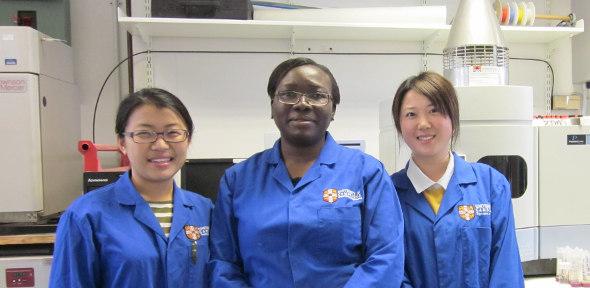
Four talented female PhD students in the Department are some of the proud recipients of the Schlumberger Foundation Faculty for the Future fellowships for their PhD studies at Cambridge University. Three are in the Geotechnical and Geoenvironmental group and supervised by Dr Abir Al-Tabbaa. Maryam Masood is at the Department's Institute for Manufacturing and supervised by Dr Claire Barlow.
What Schlumberger are doing for these women is absolutely fantastic. I was impressed with these womens' determination to succeed and to make a difference in their own countries and I was delighted to have taken part in their regional forum this year.
Dr Abir Al-Tabbaa
The Schlumberger Foundation Faculty for the Future fellowships are awarded to talented women in science and engineering from developing and emerging countries providing funding for their advanced graduate studies at top universities abroad. These awards are very competitive, include an interview process, and are awarded to women who have excelled academically and who are potential role models for other women in science and engineering.
Funmi Alayaki won scholarships to study Civil Engineering at the University of Lagos followed by a masters degree in Highway and Traffic Engineering. She worked as a road engineer for 6 years and then as an academic at the Federal University of Agriculture Abeokuta for another 6 years. She is a registered member of COREN, a corporate member of Nigeria Society of Engineers (NSE) and the Association of Professional Women Engineers of Nigeria (APWEN). Her PhD study which started in October 2011, through the Faculty for the Future fellowship is related to the development of ground improvement techniques for the difficult soils in the Niger Delta area of Nigeria. Her work involves both laboratory and field testing.
Tiffany Wang obtained a BEng in Environmental Engineering from the University of Yangzhou in China, with prizes, followed by a masters degree at Hong Kong University of Science and Technology. Her PhD project involves the assessment of the long-term performance of cement-treated contaminated soils from two field trials, one at West Drayton near Heathrow airport, completed in 1996 and the other in Castleford, Yorkshire, completed in 2011 as part of the TSB funded project SMiRT.
Rui Hao obtained a BEng in Environmental Engineering from the University of Nottingham as part of their 2+2 course (first two years in their China Ningbo Campus) and was top of her class throughout. Her PhD project is on the use of reject brines to sequester CO2 for the production of low carbon construction materials.
Maryam Masood obtained a BSc in Mechanical Engineer from the University of Engineering and Technology, Lahore, Pakistan. She then went on to obtain a masters degree in Sustainable energy systems from Queen Mary College, University of London. She has also been involved in teaching at the University of Engineering and Technology, Pakistan for one year. Her PhD project is on the analysis of the current solid waste management systems in Pakistan with a focus on quantifying the role of informal networks in the solid waste management systems.
In collaboration with Cambridge University, Schlumberger hosted their Fellows Regional Forum this year at the Moller Centre on 20-22 May. The aim of these forums is to bring these women together in-person in small groups to help strength their academic and scientific networks and further develop their leadership skills. The forum consisted of keynote lectures, workshops and poster sessions. Dr Al-Tabbaa was invited to speak to the delegates on the Contrast between Engineering Academia and Engineering Practice.
The program's long-term goal is to generate conditions that result in more women pursuing academic careers in scientific disciplines. Grant recipients are expected to return to their home countries to continue their academic careers and inspire other young women to choose careers in science and engineering. Since its launch in 2004, 323 women from 63 emerging countries have received such fellowships. Further details about the programme can be found at: www.facultyforthefuture.net
The posters presented by Funmi, Tiffany, Rui and Maryam can be downloaded at the links below:
Funmi Alayaki FFTF Forum Cambridge 2013 poster (Power Point)
Rui Hao FFTF Forum Cambridge 2013 poster (Power Point)

